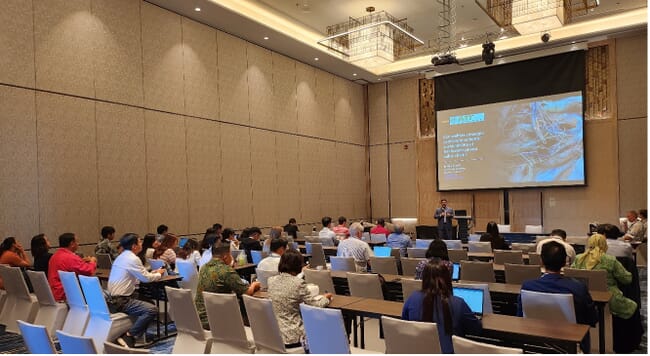
© IFS
At International Fisheries Symposium, participants engaged in discussions about enhancing the future of fish and shrimp farming, covering diverse topics such as scientific advancements, fish health, and ensuring equitable treatment for everyone in the seafood industry.
“A notable highlight of the symposium was a dedicated segment addressing the aspect of animal welfare in aquaculture. Despite being a relatively new concept in Asia, the keen interest expressed by many attendees reflected a collective eagerness to delve deeper into this important subject. The questions raised during the discussion panel showed a shared commitment to finding practical ways to enhance the well-being of aquatic animals within the unique context of Asia,” Marius Nicolini, aquaculture project manager at FAI, told The Fish Site.
“Working on animal welfare presents an opportunity to refine our approach to aquaculture. While farmers are already doing their best to care for their animals, not everyone is acquainted with the optimal practices. A comprehensive examination of fish welfare, considering the five domains model, can equip farmers with new insights into ensuring the happiness and health of their animals. Additionally, maintaining a record of this information allows farmers to demonstrate their commitment to the well-being of their animals, potentially enhancing the marketability of their products,” he added.
FAI also formalised a partnership with Can Tho University at the event. This aims to advance shrimp welfare in Vietnam by progressing the science, setting new standards, and fostering sustainable practices in the sector.
“Engaging farmers in discussions about welfare is not always straightforward; it requires adopting a new perspective, akin to using a fresh pair of glasses to see animals differently. Ultimately, when animals are living the best of their life, farmers can achieve higher quality production. Focusing on welfare practices and guiding farmers to view their work through a new lens can only be positive for the Asian aquaculture industry,” said Nicolini.
“The dynamics of the fish farming market in Asia differ significantly from other regions globally. With a strong diversity of farmed species, varied farming methods, and distinct environments, collaboration between Asian countries is a must. It is crucial for all stakeholders to join forces and develop welfare practices tailored to the unique conditions in Asia. By doing so, Asia can emerge as a leading advocate for exemplary fish and shrimp care, championing sustainable and ethical practices in aquaculture on a global scale,” he concluded.




